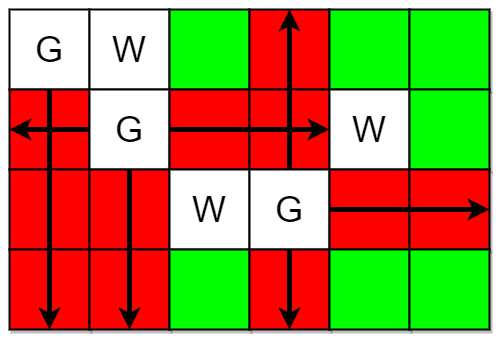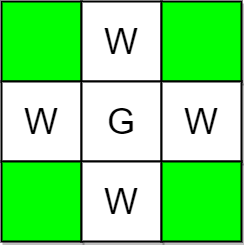2257. 统计网格图中没有被保卫的格子数
2257. 统计网格图中没有被保卫的格子数
题目
You are given two integers m and n representing a 0-indexed m x n grid. You are also given two 2D integer arrays guards and walls where guards[i] = [rowi, coli] and walls[j] = [rowj, colj] represent the positions of the ith guard and jth wall respectively.
A guard can see every cell in the four cardinal directions (north, east, south, or west) starting from their position unless obstructed by a wall or another guard. A cell is guarded if there is at least one guard that can see it.
Return the number of unoccupied cells that are not guarded.
Example 1:

Input: m = 4, n = 6, guards = [[0,0],[1,1],[2,3]], walls = [[0,1],[2,2],[1,4]]
Output: 7
Explanation: The guarded and unguarded cells are shown in red and green respectively in the above diagram.
There are a total of 7 unguarded cells, so we return 7.
Example 2:

Input: m = 3, n = 3, guards = [[1,1]], walls = [[0,1],[1,0],[2,1],[1,2]]
Output: 4
Explanation: The unguarded cells are shown in green in the above diagram.
There are a total of 4 unguarded cells, so we return 4.
Constraints:
1 <= m, n <= 10^52 <= m * n <= 10^51 <= guards.length, walls.length <= 5 * 10^42 <= guards.length + walls.length <= m * nguards[i].length == walls[j].length == 20 <= rowi, rowj < m0 <= coli, colj < n- All the positions in
guardsandwallsare unique.
题目大意
给你两个整数 m 和 n 表示一个下标从 0 开始的 m x n 网格图。同时给你两个二维整数数组 guards 和 walls ,其中 guards[i] = [rowi, coli] 且 walls[j] = [rowj, colj] ,分别表示第 i 个警卫和第 j 座墙所在的位置。
一个警卫能看到 4 个坐标轴方向(即东、南、西、北)的 所有 格子,除非他们被一座墙或者另外一个警卫 挡住 了视线。如果一个格子能被 至少 一个警卫看到,那么我们说这个格子被 保卫 了。
请你返回空格子中,有多少个格子是 没被保卫 的。
示例 1:

输入: m = 4, n = 6, guards = [[0,0],[1,1],[2,3]], walls = [[0,1],[2,2],[1,4]]
输出: 7
解释: 上图中,被保卫和没有被保卫的格子分别用红色和绿色表示。
总共有 7 个没有被保卫的格子,所以我们返回 7 。
示例 2:

输入: m = 3, n = 3, guards = [[1,1]], walls = [[0,1],[1,0],[2,1],[1,2]]
输出: 4
解释: 上图中,没有被保卫的格子用绿色表示。
总共有 4 个没有被保卫的格子,所以我们返回 4 。
提示:
1 <= m, n <= 10^52 <= m * n <= 10^51 <= guards.length, walls.length <= 5 * 10^42 <= guards.length + walls.length <= m * nguards[i].length == walls[j].length == 20 <= rowi, rowj < m0 <= coli, colj < nguards和walls中所有位置 互不相同 。
解题思路
- 数据初始化
- 使用一个二维数组
g表示网格状态:- 0:当前格子未被保卫;
- 1:当前格子被守卫保卫;
- 2:当前格子是守卫或墙。
- 将
guards和walls的位置初始化为 2。
- 模拟守卫的视线
- 遍历每个守卫
(gx, gy),从其位置向四个方向(上下左右)扩展,直到:- 超出边界;
- 遇到墙或其他守卫(值为 2)。
- 对每个可以扩展的格子,标记为 1(被保卫)。
- 统计未被保卫的格子
- 遍历整个网格,统计值为 0 的格子数,即未被保卫的格子。
复杂度分析
- 时间复杂度:
O(k * max(m, n) + m * n)。- 遍历
guards和其四个方向扩展的操作,复杂度约为O(k * max(m, n)),其中k是守卫的数量; - 统计未被保卫的格子需要遍历一次矩阵,复杂度为
O(m * n); - 总复杂度为
O(k * max(m, n) + m * n)
- 遍历
- 空间复杂度:
O(m * n),需要一个二维数组g。
代码
/**
* @param {number} m
* @param {number} n
* @param {number[][]} guards
* @param {number[][]} walls
* @return {number}
*/
var countUnguarded = function (m, n, guards, walls) {
// 初始化网格
const g = new Array(m).fill().map(() => new Array(n).fill(0));
// 设置守卫和墙的位置为 2
for (let [x, y] of guards) {
g[x][y] = 2;
}
for (let [x, y] of walls) {
g[x][y] = 2;
}
// 定义四个方向
const dirs = [
[-1, 0],
[1, 0],
[0, -1],
[0, 1]
];
// 遍历每个守卫,模拟其视线
for (let [gx, gy] of guards) {
for (let [dx, dy] of dirs) {
let x = gx,
y = gy;
while (true) {
x += dx;
y += dy;
// 超出边界或遇到障碍物
if (x < 0 || y < 0 || x >= m || y >= n || g[x][y] == 2) {
break;
}
// 标记当前格子为被保卫
g[x][y] = 1;
}
}
}
// 统计未被保卫的格子数
return g.reduce((sum, row) => sum + row.filter((i) => i == 0).length, 0);
};
相关题目
| 题号 | 标题 | 题解 | 标签 | 难度 | 力扣 |
|---|---|---|---|---|---|
| 361 | 轰炸敌人 🔒 | 数组 动态规划 矩阵 | 🟠 | 🀄️ 🔗 | |
| 999 | 可以被一步捕获的棋子数 | [✓] | 数组 矩阵 模拟 | 🟢 | 🀄️ 🔗 |
